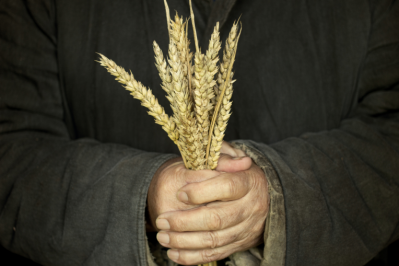‘We must do our bit to avoid starvation in the Global South’: Report calls on Europe to ‘beat Putin’s global food blackmail’

Warnings have been mounting that the world is facing a global food catastrophe.
At a time when global food supplies were already stretched by extreme weather and the lingering impact of COVID, Russia’s invasion of Ukraine has raised concerns that Moscow is tightening its strangle hold on the world’s fourth-largest wheat and corn exporter.
In an average year, Ukraine’s soils produce enough food to support 400 million people. But the Russian blockade of Ukrainian Black Sea ports has brought shipments of food that would otherwise have been destined for export markets to a standstill. The impact can be seen in global food prices, which are up by more than a fifth. According to the UN World Food Progtamme, up to 49 million people in dozens of countries ‘could now be at risk of falling into famine or famine-like conditions’.
Aide agencies are warning that it is too late to avert widespread famine in East Africa. The World Bank says 100m more people are expected to go hungry this year. Each 1% increase in global food prices pushes an extra 10m people into extreme poverty.
As the events leading up to the Arab Spring underline, the ripple effects of severe food shortages are stark: social unrest, political instability, conflict and mass migration.
But a report out today from NGO RePlanet suggests that Europe has the capacity to avert mass starvation in the Global South.
“Europe can and must beat Putin’s global food blackmail,” urged report author Mark Lynas, a veteran environmentalist and co-founder of RePlanet. “Just as Europe must stop buying fossil fuels from the Kremlin by saving energy, so we must also do our bit to help avoid starvation in the Global South by sparing food at home.”
Outlining how the European Union can avoid worsening the food crisis, RePlanet calls for the adoption of measures including scrapping biofuels, reducing meat consumption and boosting agricultural productivity on the continent.
What action does RePlanet back to block Putin?
“If Europe doesn’t pragmatically look at finding evidence-based solutions, the outcome will be worse for the world’s poor, for the climate and for nature conservation. It will also make it harder to face down Putin’s aggression in Ukraine. Europe can and must do better,” insisted Adam Blazowski, RePlanet’s chair.
What ‘pragmatic solutions’ is the NGO backing?
Europe burns the equivalent of 15 million loaves of bread every day to power its cars, as 10,000 tonnes of wheat are turned into ethanol daily. Eliminating biofuels would avoid wheat and other grains being diverted into ethanol for cars, RePlanet argued. This way, about a fifth of total Ukraine wheat exports can be substituted, it suggested. This would also avoid land clearance both in and outside Europe, the environmentalists added.
European meat consumption was also in RePlanet’s sights, with the NGO suggesting Europeans must be encouraged to eat less meat, particularly beef and pork. This, the report argued, would mean ‘large amounts of grain can be spared for humans to eat directly’.
Currently, 160m tonnes of cereals are fed to animals in the EU, which produces a total of 274m tonnes of cereals annually. Reducing European meat consumption by half could free up 80 million tonnes of grains, RePlanet figures suggest. “This transition towards plant-based alternatives can begin immediately, which will help reduce greenhouse gas emissions and spare large amounts of land for rewilding and conservation,” the organisation claimed.
Lastly, RePlanet suggested, the European Union must reconsider its target to more than triple the share of agricultural land under organic farming to 25% by 2030. The focus on organic production enshrined in the Farm to Fork strategy will make agriculture ‘less productive, reducing grains production by an estimated 20 million tonnes’, RePlanet stated.
Instead, the bloc should look to new crop breeding approaches to boost both production and resilience. “Europe should lift its prohibitionary regime on biotech crops, including transgenic and gene edited crops, which can help make agriculture more productive and sustainable,” the report suggested, claiming that new crop breeding technologies could result in 20% yield increases for transgenic and gene edited crops. This would equate to gains totalling more than Russia’s and Ukraine’s wheat exports combined.




















